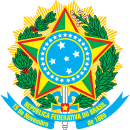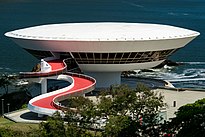
Back ثقافة البرازيل Arabic Култура на Бразилия Bulgarian ব্রাজিলের সংস্কৃতি Bengali/Bangla Cultura del Brasil Catalan Cultura de Brasil Spanish فرهنگ در برزیل Persian Culture du Brésil French תרבות ברזיל HE Brazília kultúrája Hungarian Kulturo di Brazilia IO
| Part of a series on the |
| Culture of Brazil |
|---|
 |
| Society |
| Topics |
| Symbols |
The culture of Brazil has been shaped by the amalgamation of diverse indigenous cultures, and the cultural fusion that took place among Indigenous communities, Portuguese colonists, and Africans, primarily during the Brazilian colonial period. In the late 19th and early 20th centuries, Brazil received a significant number of immigrants, primarily of Portuguese, Italian, Spanish, and German origin, which along with smaller numbers of Japanese, Austrians, Dutch, Armenians, Arabs, Jews, Poles, Ukrainians, French, Russians, Swiss, Hungarians, Greeks, Chinese, and Koreans gave a relevant contribution to the formation of regional cultures in Brazil, and thus contributed to its current existence as a plural and racially diverse society.[1]
As consequence of three centuries of colonization by the Portuguese empire, many aspects of Brazilian culture are derived from the culture of Portugal.[2] The numerous Portuguese inheritances include the language, cuisine items such as rice and beans and feijoada, the predominant religion and the colonial architectural styles.[3] These aspects, however, were influenced by African and Indigenous traditions, as well as those from other Western European countries.[4] Some aspects of Brazilian culture are contributions of Italian, Spaniard, German, Japanese and other European immigrants.[5] Amerindian people and Africans also played an important role in the formation of Brazilian language, cuisine, music, dance and religion.[5][6]
This diverse cultural background has helped show off many celebrations and festivals that have become known around the world, such as the Brazilian Carnival and the Bumba Meu Boi. The colourful culture creates an environment that makes Brazil a popular destination for tourists, who visit over 1 million annually.[7]
- ^ "BRASIL CULTURA | O site da cultura brasileira". Archived from the original on April 5, 2009.
- ^ Teresa A. Meade (2009). A Brief History of Brazil. Infobase Publishing. p. 146. ISBN 978-0-8160-7788-5.
- ^ "15th-16th Century". History. Brazilian Government official website. Archived from the original on 2007-06-15. Retrieved 2008-06-08.
- ^ "People and Society". Encarta. MSN. Archived from the original on 2009-10-29. Retrieved 2008-06-10.
- ^ a b "Population". Encarta. MSN. Archived from the original on 2009-10-29. Retrieved 2008-06-10. [dubious – discuss]
- ^ Freyre, Gilberto (1986). "The Afro-Brazilian experiment – African influence on Brazilian culture". UNESCO. Archived from the original on January 24, 2008. Retrieved 2008-06-08.
- ^ "The Culture of Brazil". Archived from the original on 11 January 2012. Retrieved 20 September 2011.









